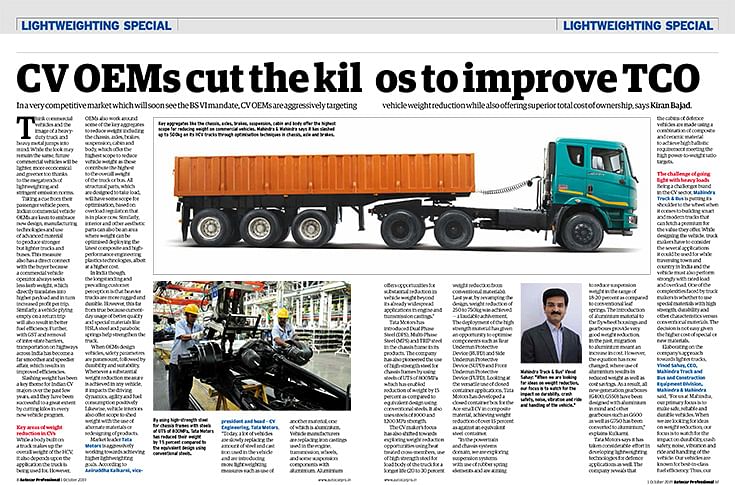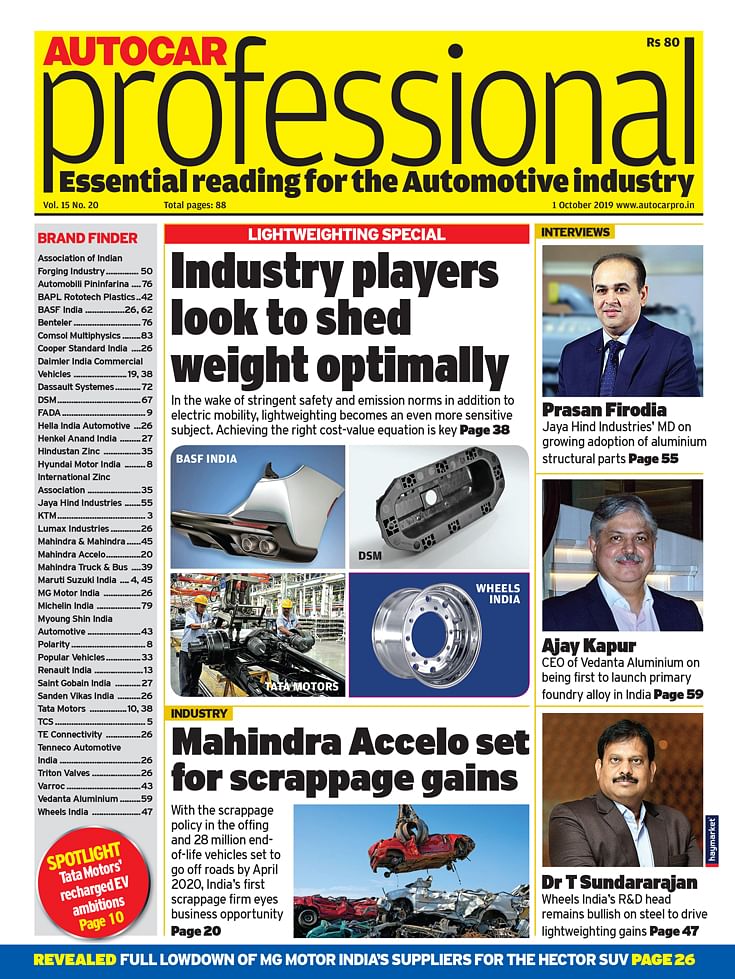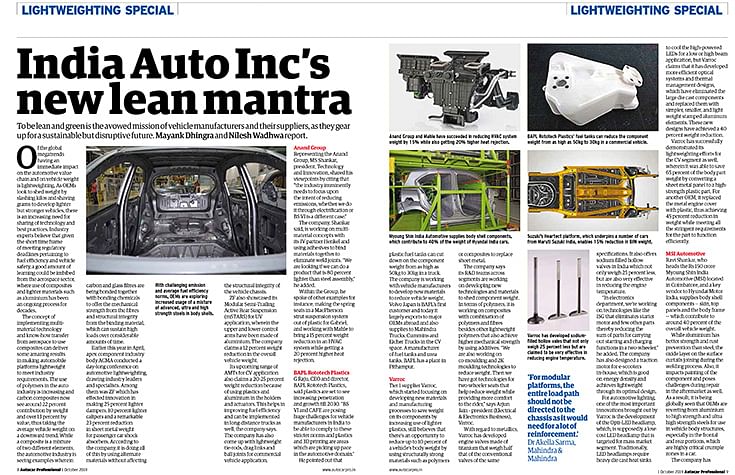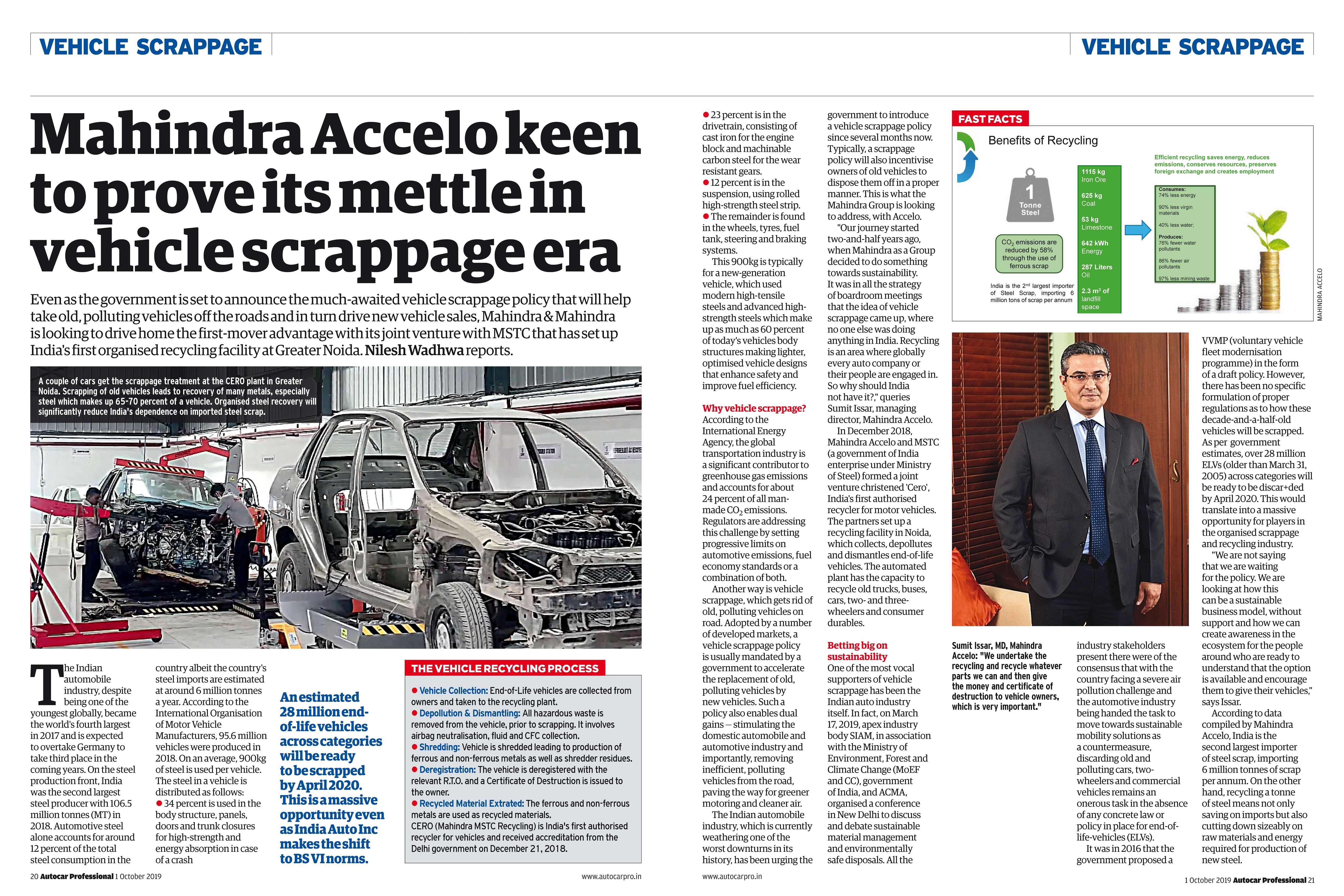Autocar Professional’s October 1 issue is a heavyweight on lightweighting
Lightweighting remains the No. 1 issue and among the biggest challenges for both OEMs and suppliers. We reveal the latest advances at India Auto Inc and also globally through a riveting mix of news stories, features and interviews.
Even as the megatrend of CASE (Connected, Autonomous, Shared, and Electrified) envelops the global automotive industry, vehicle lightweighting remains the No. 1 issue and among the biggest challenges for both OEMs and suppliers. Reason enough for Autocar Professional’s Lightweighting Special. Now, in its 10th year, this annual is a heavyweight – 88 pages of in-depth features, exclusive interviews with CEOs and industry analysis.
In the world of vehicles, the maximum scope for cutting the kilos is with commercial vehicles, and aggregates like the chassis, axles, suspension, cabin and body. In a detailed four-page analysis, we take a close look at just what leading truck and bus makers including Tata Motors, Mahindra Truck & Bus and Daimler India CV are doing in India to reduce CV weight and improve the critical Total Cost of Ownership (TCO) equation for the CV fleet owner. We also have an interview with Aniruddha Kulkarni, Vice-President and Head – CV Engineering, Tata Motors.

For India Auto Inc, the mission to be lean and green has become a mantra for sustainability and to remain relevant in a disruptive future. Following up on an ACMA conference on lightweighting earlier this year, we have the details on recent advances at some OEMs including Maruti Suzuki India and Mahindra & Mahindra and some leading suppliers – Varroc, Anand Group, BAPL Rototech Plastics and Myoung Shin India Automotive.


Suppliers are doing their bit to help OEMs shed vehicle weight. Jaya Hind Industries, part of the Dr Abhay Firodia Group, recently announced that it has developed its first structural part – an aluminum cross-member – for an OEM’s upcoming model using the high-pressure die casting route and achieved sizeable 35 percent weight savings. And as managing director Prasan Firodia tells us, “the cost advantage is expected to be substantial for high-volume scenarios.”
Meanwhile, Vedanta Aluminium has become the first aluminium producer to launch primary foundry alloy for the automotive industry in India. Aluminium PFAs are known for their excellent metal quality offering superior castability that make them a preferred choice for critical applications in the auto industry. These alloys are used to manufacture important components such as alloy wheels, cylinder heads and brake systems among others. We speak to Ajay Kapur, CEO – Aluminium and Power, Vedanta Aluminium, who is understandably bullish about growth prospects for the company. “'With stricter safety and emission norms alongside demand for lightweighting and EVs, we foresee aluminium industry segments like extrusion, casting and rolling playing a major transformational role,' he tells us.
Aluminium is what Wheels India is also banking on to make lighter wheels for a wide spectrum of vehicles ranging from PVs, CVs, off-road, and for agricultural, mining and construction equipment. The TVS Group company and Tier 1 supplier is benefiting from new materials and processes. We get the details from Dr T Sundararajan, Head – R&D, Wheels India.
With the industry driving towards lighter materials, the forgings industry – a key supplier to automakers – will surely be impacted. It already has been hit by the downturn, what with 60 percent of its revenue coming from the domestic auto industry. Muralishankar Sambasivam, President of the Association of Indian Forging Industry, tells us how the sector is tackling troubled times, how it is meeting OEM demand for lighter but stronger forgings and is also readying for the charge of EVs.
Adopting weight loss therapy also means using high-performance engineering plastics. As lightweighting becomes the need of the hour for automakers, engineering plastics major DSM is exploring deeper synergies with OEMs and suppliers to drive in innovation. We have a detailed report.
Meanwhile, BASF, the leading chemical supplier to the auto industry, is targeting new growth with the advent of BS VI norms in India as well as the OEM drive to reduce vehicle weight. As Brieux Boisdequin, Vice-President — Automotive Business, Strategy And New Business Development, BASF India, tells us in an interview, “Moving from metal to plastic calls for a lot of material and design optimisation. We invite designers from the auto industry to our Creation Centre in Mumbai to come and feel the different materials that we have in our library.”
In the modern automotive scheme of things, can one leave software behind? Dassault Systemes is one software developer which is helping OEMs and suppliers with its suite of solutions. According to Bhavesh Kumar, Brand Leader, Simulia India and Eric Bienvenu , Vice-President — Simulia World Wide Sales, Dassault Systèmes, 3D simulation software SIMULIA's applications accelerate the process of evaluating the performance, reliability and safety of materials and products before committing to physical prototypes.
Lightweighting also extends to the four patches of rubber that keep vehicles glued onto the road. Writing exclusively for Autocar Professional, Dr Arun Jaura, Managing Director, Michelin India Technology Centre, says: “'The recipe to a sustainable long-term weight efficiency implementation strategy will be possible through partnership of like-minded stakeholders that can form the winning pentagon — mobility fraternity, investment, academic institutions, regulators and policy makers, and the skillsets.'
In another guest column, Pawan Soami , Technical Product Manager —Composite Materials Module and Multibody Dynamics Module, COMSOL Multiphysics, writes a detailed analysis of Multiphysics simulation for composite materials.
M&M to get first-mover scrappage advantage, MG Hector’s suppliers revealed
If there is one company which is ready to move in fast when the much-awaited vehicle scrappage policy gets the green signal from the government, then it is Mahindra Accelo, M&M’s joint venture with MSTC, which has India’s first organized vehicle recycling facility in Greater Noida.

This comprehensive feature reveals the inner details of the recycling process, the benefits of recycling and how India can both reduce its imports of steel as well as lower its cost of production. According to Sumit Issar, MD, Mahindra Accelo, the company has replicated the best of the recycling industry in Japan and Europe and that the Noida facility is among the best globally.
In yet another detailed feature, we reveal MG Motor India’s plan to ramp up production as well as localisation, while also detailing 70 component suppliers to the MG Hector SUV. And, as Rajeev Chaba, President and MD, MG Motor India, says “All our vendors – global and local – were selected with a greater focus on quality than cost.”
Tata Motors’ future EV game-plan, Renault Triber’s clever engineering
Tata Motors is aiming to be a globally competitive EV player. The company recently revealed its Ziptron electric powertrain platform, designed to be the driver of future EVs from the company. Ziptron is part of Tata Motors’ reworked EV strategy under which all the four new models are being lined up to enter the electric mobility market over the next 12-18 months.
The recently launched Renault Triber has created a brand-new segment within the sub-four-metre space. But does it really offer enough space for seven at a sub-Rs 700,000 price-tag? Finds out how the car maker managed to liberate maximum interior within a tight exterior.
In an exclusive interview, Arvind Sawant, Union Minister for Heavy Industries and Public Enterprises, speaks about the government's focus on promoting electric mobility, the need to ensure employment stability in the transition, and also shares a message for the IC engine vehicle industry, which is tackling a serious slowdown.
We also speak to Ashish H Kale, the President of the Federation of Automobile Dealers Associations (FADA) on the industry slowdown, reducing high two-wheeler inventory levels, dealing with disruptions, why a scrappage policy will drive CV fleet sales, and training next-generation dealer-owners at the FADA Academy.
Lots of news too
With plenty of industry activity in the past fortnight, it’s not surprising that this issue contains lots of exciting news starting with how India has become KTM’s largest global market. The same period also saw TCS ink a strategic deal for the assets and skilled personnel of GM Technical Centre India in Bangalore, and Tamil Nadu announce a policy designed to make the state an EV hub. All this and much more in the latest issue.
Where to buy?
Autocar Professional magazine is available through all good newsagents and for download from Magzster. You can also buy one-off copies of Autocar Professional magazine – contact Ganesh at [email protected]. Alternatively, never miss an issue – subscribe to Autocar Professional magazine today.
Also read: Scrappage Policy to apply polluter-pays principle, 1900% hike in fee for re-registered vehicles
RELATED ARTICLES
Cosmo First diversifies into paint protection film and ceramic coatings
The Aurangabad, Maharashtra-based packaging materials supplier is leveraging its competencies in plastic films and speci...
JSW MG Motor India confident of selling 1,000 M9 electric MPVs in first year
The 5.2-metre-long, seven-seater luxury electric MPV, which will be locally assembled at the Halol plant in Gujarat, wil...
Modern Automotives targets 25% CAGR in forged components by FY2031, diversifies into e-3Ws
The Tier-1 component supplier of forged components such as connecting rods, crankshafts, tie-rods, and fork bridges to l...






 By Autocar Professional Bureau
By Autocar Professional Bureau
 30 Sep 2019
30 Sep 2019
 16556 Views
16556 Views









